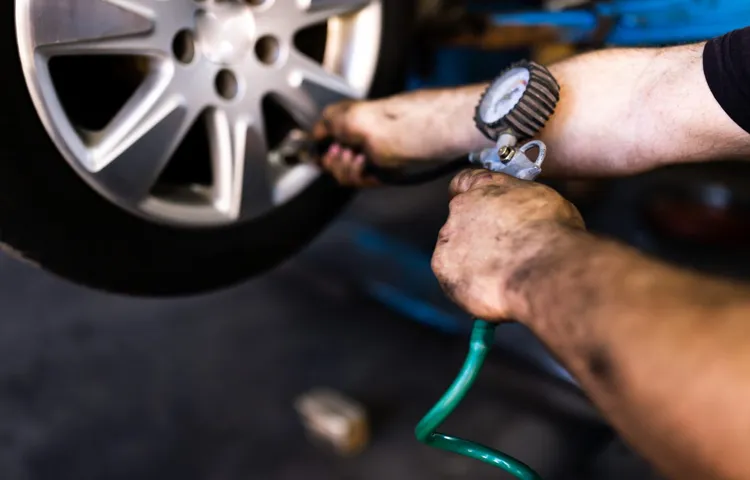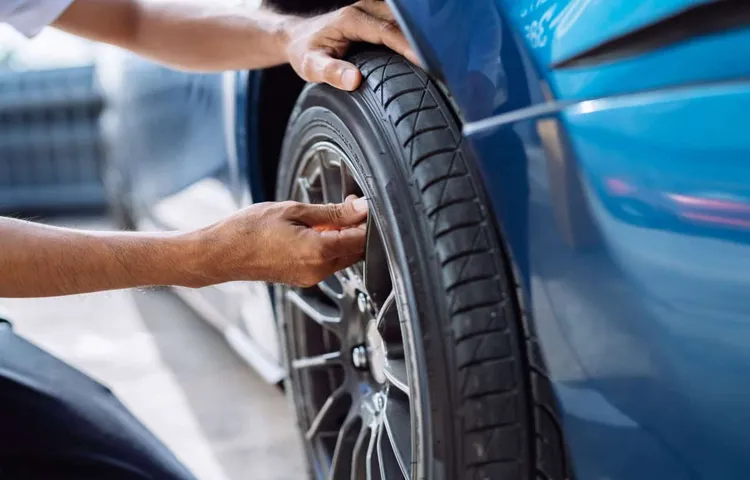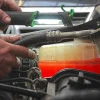If you’re like most drivers, you’ve heard about nitrogen tire inflation and wonder what the fuss is all about. One question that frequently comes up is whether air can be used in place of nitrogen to fill your tires. The answer is yes, but there are many trade-offs to consider.
The main benefit of using nitrogen in your tires is better fuel efficiency. Nitrogen molecules are larger than oxygen molecules, which means they don’t escape the tire as easily. This leads to better tire pressure retention and allows your tires to maintain the correct inflation level over a longer period.
However, using regular air to fill your tires is less expensive and available wherever gas stations offer air compressors. While it is tempting to keep things simple and use ordinary air, there are some downsides to consider. Air is more likely to react with the materials of the tire and the wheel, eventually causing rust and corrosion.
Also, regular inflation may lead to inconsistent tire pressure, particularly if the temperature changes dramatically. Overall, there are advantages and disadvantages to using either nitrogen or air to inflate your tires. Ultimately, it’s up to you to decide which choice is in your best interest.
Whether you choose nitrogen or air, be sure to maintain your tire pressure regularly and keep your tires in good condition, as this will enhance your driving experience and prolong the longevity of your tires.
Understanding Nitrogen Tires
If you put regular air into a nitrogen tire, you probably wouldn’t notice any significant differences in your tire’s performance. However, it’s important to note that nitrogen tires are specifically filled with pure nitrogen for good reason. Nitrogen is a dry and inert gas that doesn’t react with the rubber of your tire or any other metal components inside, which helps to avoid corrosion and oxidation over time.
Additionally, nitrogen molecules are larger than oxygen molecules found in regular air, which means nitrogen can better maintain tire pressure over time. Oxygen molecules can slowly seep out of the tire, whereas nitrogen does not. So while you won’t necessarily experience any immediate negative effects from filling a nitrogen tire with air, it’s still important to stick to filling your nitrogen tires with pure nitrogen for the long term benefits it provides.
Benefits of Nitrogen Tires
Nitrogen tires are tires that are filled with pure nitrogen gas instead of regular air. While it may sound like a new concept, nitrogen tires have been around for quite some time. The benefits of using nitrogen tires are numerous.
One important benefit is that nitrogen is less likely to seep through the rubber material of the tire, meaning the tire pressure remains stable for longer periods. This leads to better fuel efficiency and prolonged tire life. Additionally, nitrogen is inert, which means it doesn’t react with the rubber or metal components of the tire, and doesn’t cause corrosion.
Moreover, nitrogen helps to maintain consistent tire pressure, thus reducing the need for routine maintenance and checking of pressure levels. In conclusion, while nitrogen tire filling may come at an extra cost, it offers a range of benefits that make it a worthwhile investment in the long run.

Why Use Nitrogen Tires
Nitrogen tires have become increasingly popular among car owners due to their perceived benefits over traditional air-filled tires. Nitrogen tires are filled with pure nitrogen gas, instead of compressed air, which is made up of nitrogen, oxygen, and other trace gases. The main reason car owners choose nitrogen tires is because they are less prone to pressure changes, especially during extreme temperatures.
This means that nitrogen tires maintain their pressure better and for a longer period of time, helping to increase fuel efficiency and overall tire life. Additionally, nitrogen is less likely to seep through the tire’s rubber walls over time, thus reducing the risk of blowouts. While nitrogen tires may come with a slightly higher price tag, many car owners feel the peace of mind is worth the investment.
Adding Air to Nitrogen Tires
Wondering what happens if you put air in a nitrogen tire? It’s more common than you might think, especially since nitrogen isn’t always readily available. The consequences aren’t as dire as some might believe, though. Adding air to nitrogen-filled tires won’t necessarily cause any problems, especially if it’s a small amount.
However, it’s worth noting that doing so will dilute the nitrogen concentration in the tire, which can affect its performance. Nitrogen is valued for its purity and lack of moisture, which helps prevent corrosion within the tire. Air, on the other hand, carries moisture and other impurities that can cause rust and other problems over time.
Ultimately, the choice to use nitrogen or air is up to the driver, but it’s worth considering the potential drawbacks of mixing the two.
What Happens When You Put Air in Nitrogen Tires?
Putting air in nitrogen tires can cause a few issues. Nitrogen is used in tires because it doesn’t expand and contract as much with temperature changes, keeping tire pressure more stable. However, adding regular air to these tires can dilute the nitrogen and compromise its ability to regulate tire pressure.
In some cases, adding air can even cause the nitrogen to escape through the tire’s rubber walls, causing a loss of pressure. Additionally, mixing air and nitrogen can cause tire pressure sensors to become inaccurate, leading to potential safety issues. It’s best to stick with nitrogen if that’s what your tires were originally filled with and to make sure to get them refilled with nitrogen if they need it.
Effects on Tire Pressure and Efficiency
Adding air to nitrogen-filled tires can affect the tire pressure and efficiency. While nitrogen-filled tires are known to maintain their pressure for longer periods than air-filled tires, adding air can dilute the nitrogen and lower the overall purity level. This may lead to increased tire pressure and reduced fuel efficiency.
If the tires were initially inflated with nitrogen, it is recommended to continue refilling with nitrogen instead of adding air. However, in case of emergencies where nitrogen is not available, adding air is a viable short-term solution. It is important to note that overinflated tires can lead to reduced traction and handling, while underinflated tires can wear out more quickly and affect fuel efficiency.
Therefore, it is crucial to maintain the recommended tire pressure levels for optimal performance and safety.
Effects on Tire Wear and Longevity
When it comes to nitrogen tires, many wonder about the effects of adding air. It is important to remember that nitrogen-filled tires are designed to maintain a stable pressure and reduce water vapor inside the tires, which ultimately helps prolong their lifespan. Adding air to these tires may dilute the nitrogen and hamper its ability to regulate the pressure and prevent excessive heat buildup.
This, in turn, can negatively affect tire wear and longevity. Although it may seem like a convenient solution for a quick top-off, it is best to stick with nitrogen to ensure the longevity and performance of your tires. So, unless it is a dire emergency, it is best to hold off adding air and opt for a nitrogen top-off instead.
Conclusion
Well, as it turns out, putting air in a nitrogen tire is kind of like trying to teach a cat to swim. It’s just not worth the effort and there’s really no benefit. Nitrogen is already a pretty stable and efficient choice for tire inflation, so adding air to the mix just muddies the waters (or should we say, airwaves?).
Plus, at the end of the day, you’re left with a tire that’s just as full as before, but with a lot more confusion and potentially wasted effort. So let’s all just stick to good ol’ nitrogen, shall we?”
Preventing Air from Entering Nitrogen Tires
Nitrogen tires have several benefits over regular tires filled with compressed air, such as improved gas mileage, longer tire life, and better handling. However, one of the biggest challenges is preventing air from entering nitrogen tires, as this can compromise their performance. To avoid this, it’s important to make sure that the tires are properly filled with nitrogen in the first place and that the valve stem and sealing components are in good condition.
Additionally, it’s essential to avoid mixing air with nitrogen, as even a small amount of compressed air can undermine the benefits of nitrogen-filled tires. If you ever need to add air to a nitrogen tire, it’s crucial to consult with a professional instead of attempting to do it yourself, as improper inflation can lead to a host of problems such as uneven tire wear and poor handling. By taking proper precautions and seeking expert advice, you can ensure that your nitrogen tires function at their best and provide you with a safer, more efficient driving experience.
Importance of Proper Tire Maintenance
Proper tire maintenance is crucial for the longevity and safety of your vehicle. One important aspect of tire maintenance is ensuring that your tires have the proper amount of air pressure. If you have nitrogen-filled tires, you may be wondering if you can add regular air to them.
The short answer is yes, but it’s not recommended. Nitrogen is a slow leaker, meaning it will maintain proper pressure for longer periods than regular air. Mixing regular air with nitrogen can cause the nitrogen to leak out faster and compromise the tire’s performance.
It’s best to stick with the nitrogen and have it topped off at a tire shop or service center that offers nitrogen refills. Taking care of your tires by maintaining proper air pressure will not only improve your vehicle’s fuel efficiency, but it will also increase your safety on the road. Don’t skimp on proper tire maintenance, it’s worth the investment in the long run.
FAQs
What is a nitrogen tire?
A nitrogen tire is one that is filled with nitrogen instead of regular air.
Can you mix nitrogen and regular air in a tire?
While it is not recommended, it is possible to mix the two, but it is better to stick to one type of inflation.
What are the benefits of using nitrogen in tires?
Nitrogen can help maintain tire pressure for longer periods and reduce the risk of tire blowouts.
Will using nitrogen in tires improve fuel efficiency?
While there may be a slight improvement in fuel efficiency, it is not significant enough to make a noticeable difference.
Is nitrogen more expensive to fill in tires than regular air?
Yes, nitrogen is generally more expensive to fill in tires, but the benefits may outweigh the cost for some people.
Can nitrogen affect the lifespan of tires?
No, nitrogen does not directly affect the lifespan of tires, but it can help maintain tire pressure, which can contribute to the tire’s longevity.
What happens if you put regular air in a tire that has nitrogen in it?
It is not recommended to mix gases in a tire, as it can affect tire pressure and performance. It is best to have the tire drained and refilled with the desired gas.



